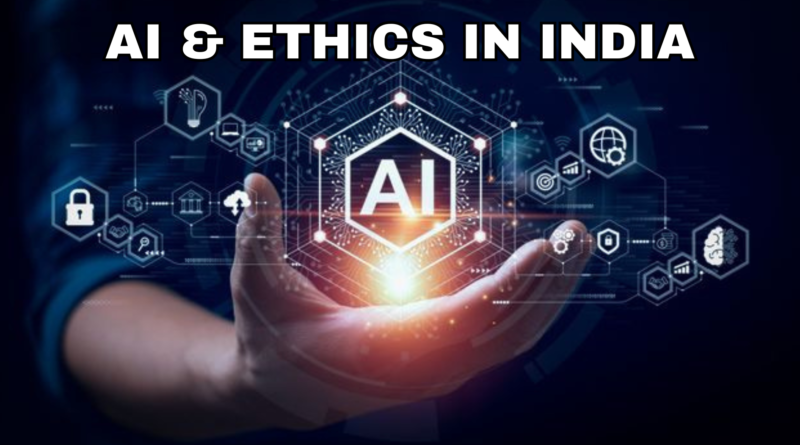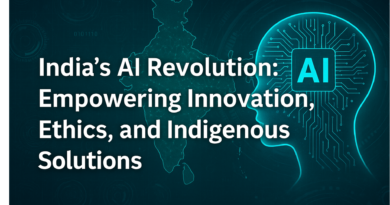AI & ETHICS IN INDIA
Building a Secure, Inclusive, and Competitive Future
Bengaluru, often hailed as India’s “Silicon Valley,” is set to become the epicenter of discussions on the future of artificial intelligence as the Economic Times hosts a high-profile livestream ahead of the “Soonicorns Summit 2025.” This event will not merely showcase technological ambition it will serve as a critical platform for tackling some of the most pressing questions around AI’s role in India’s economic and social trajectory.
At the heart of the conversation is a complex balancing act: how can India harness AI to accelerate growth while ensuring that its deployment remains ethical, inclusive, and aligned with the nation’s diverse needs? The agenda draws attention to three core pillars localized infrastructure, fintech security, and ethical governance which together form the foundation of a sustainable AI future.
Localized Infrastructure: AI That Speaks India’s Language(s)
India’s AI aspirations cannot simply be imported wholesale from global models; they require customization to fit the nation’s linguistic, cultural, and infrastructural realities. The livestream is expected to emphasize the importance of building AI systems that understand and interact in India’s 22 officially recognized languages and hundreds of dialects. This linguistic diversity poses unique challenges in natural language processing, but it also presents enormous opportunities for inclusive innovation.
Localized AI infrastructure also extends beyond language. India’s urban and rural digital divide means that AI systems must be designed to operate reliably even in areas with inconsistent connectivity and limited computing resources. This necessitates investments in edge computing, low-power AI chips, and decentralized data processing technologies that could redefine how AI reaches every corner of the country.
Fintech Security: AI as Both Guardian and Risk Factor
As India emerges as one of the fastest-growing digital payments markets in the world, fintech is an obvious area where AI can make transformative impacts. AI-powered fraud detection, credit scoring, and personalized financial services are already reshaping the sector. However, the livestream will likely explore the flip side of this innovation AI’s potential to be exploited by cybercriminals.
Deepfake-driven scams, algorithmic bias in loan approvals, and vulnerabilities in biometric authentication systems represent serious threats. These issues demand robust AI security protocols that not only protect consumer data but also preserve public trust in financial technologies. Leaders in the fintech space are expected to discuss frameworks for ethical AI deployment that ensure transparency, accountability, and compliance with both domestic and global regulations.
Ethical Governance: Building AI That Respects Rights and Values
Ethical AI governance is emerging as a decisive factor in determining which nations become leaders in the technology’s future. India’s approach must be grounded in its democratic values, prioritizing human rights, fairness, and societal welfare. The livestream will likely highlight the need for regulatory bodies that can evolve alongside technology, ensuring that laws and guidelines remain relevant in a fast-changing environment.
This governance must also consider the unique socio-economic realities of India. For example, while AI-driven automation can boost productivity, it can also displace jobs in industries where millions are employed. Policymakers and entrepreneurs alike will need to craft strategies for reskilling the workforce, creating new employment opportunities, and ensuring that AI serves as a tool for empowerment rather than exclusion.
Positioning India on the Global AI Map
The “Soonicorns Summit 2025” is not just about national priorities it’s about global competitiveness. As the livestream discussions will likely underline, AI leadership will be determined not only by innovation but by the ability to set ethical and technical standards that others adopt. India has the opportunity to position itself as a thought leader in responsible AI, influencing international norms while fostering homegrown innovation.
Bengaluru’s vibrant startup ecosystem, combined with the nation’s policy focus on digital transformation, provides fertile ground for this vision. However, success will depend on collaboration between government, industry, academia, and civil society. If India can align these stakeholders around shared principles and clear objectives, it may well become a model for how emerging economies can lead the AI revolution on their own terms.
As the Economic Times livestream unfolds, the conversation will inevitably extend beyond technical blueprints into the realm of societal impact. The question is not simply “How can we build powerful AI?” but “How can we build AI that is good for India?” In addressing that challenge, Bengaluru will once again affirm its place at the forefront of the country’s and perhaps the world’s technological destiny.




